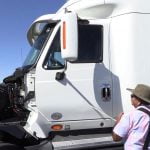Avoiding Distractions
Followthese tips provided bythe National Highway Traffic Safety Administration, the National Safety
Council and the AAA Foundation for Traffic Safety to avoid being distracted while driving:
Do not
Do not drink alcohol before driving.
Do not read or write while driving. Complete driver paperwork while the vehicle is stopped and parked in a safe area
Do not try to type, text or read messages on a computer or satellite communication system while driving pull off the road at a safe and legal parking location to perform these tasks.
Do not engage in stressful or emotional conversations with passengers in the vehicle.
Do not let occupants of other vehicles distract you from your focus on driving.
Do
Get adequate sleep before any trip. Fatigue decreases attention and reaction time.
Avoid taking any medication that can cause drowsiness, either before the trip or while driving. Be sure to read the label carefully. Consult with your physician regarding alternate medications that do not cause drowsiness.
Review driving directions and maps and check traffic and weather conditions before your trip.
Clean and adjust all mirrors for best all-around visibility before starting the vehicle.
Pre-select and pre-load your favorite music before driving.
Tum off cell phones. Pull off the road in a safe and legal place when making or receiving call on a cell phone. Even hands-free devices have proven to be a driving distraction that cause collisions.
Clear the vehicle of unnecessary objects.
Become familiar with the location and use of in-cab controls before you start driving.
Postpone eating and drinking until the vehicle is safely stopped. Many collisions have occurred by just getting a sandwich out of the cooler” while driving.
Avoid being distracted by billboards or other forms of non-driving related signs.
Be obsewant of pedestrians, but do not let them be a distraction to your driving.
Always keep your emotions under control when in stressful driving situations.
Look for these same distractions in other drivers and give them plenty of room.
Drive defensively. Plan for and expect the unexpected, always leave yourself an out.
REMEMBER TO
DRIVE DEFENSIVELY.
PLAN FOR AND EXPECT THE UNEXPECTED.
ALWAYS LEAVE YOURSELF AN OUT.

This article is Provided by Sunlight Logistics Inc





